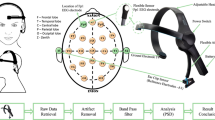Abstract
Human brains expose the possibility to be connected directly to the intelligent computing applications in form of brain computer/ machine interfacing (BCI/BMI) technologies. Neurophysiological signals and especially electroencephalogram (EEG) are the forms of brain electrical activity which can be easily captured and utilized for BCI/BMI applications. Those signals are unfortunately highly contaminated by noise due to a very low level of electrophysiological signals and presence of different devices in the environment creating electromagnetic interference. In the proposed approach we first decompose each of the recorded channels, in multichannel EEG recording environment, into intrinsic mode functions (IMF) which are a result of empirical mode decomposition (EMD) extended to multichannel analysis in this paper. We present novel and interesting results on human mental and cognitive states estimation based on analysis of the above mentioned stimuli-related IMF components.
Preview
Unable to display preview. Download preview PDF.
Similar content being viewed by others
References
Rutkowski, T.M., Vialatte, F., Cichocki, A., Mandic, D., Barros, A.K.: Auditory Feedback for Brain Computer Interface Management - An EEG Data Sonification Approach. In: Gabrys, B., Howlett, R.J., Jain, L.C. (eds.) KES 2006. LNCS (LNAI), vol. 4253, pp. 1232–1239. Springer, Heidelberg (2006)
Rutkowski, T.M., Cichocki, A., Ralescu, A.L., Mandic, D.P.: Emotional States Estimation from Multichannel EEG Maps. In: Wang, R., Gu, F., Shen, E. (eds.) Advances in Cognitive Neurodynamics ICCN 2007 - Proceedings of the International Conference on Cognitive Neurodynamics. Neuroscience, Springer, Heidelberg (in press, 2008)
Rutkowski, T.M., Cichocki, A., Mandic, D.P.: EMDsonic - An Empirical Mode Decomposition Based Brain Signal Activity Sonification Approach. Information Technology: Transmission, Processing and Storage. In: Signal Processing Techniques for Knowledge Extraction and Information Fusion, February 2008, pp. 261–274. Springer, Heidelberg (2008)
Wolpaw, J.R., Birbaumer, N., McFarland, D.J., Pfurtscheller, G., Vaughan, T.M.: Brain-computer Interfaces for Communication and Control. Clinical Neurophysiology 113, 767–791 (2002)
Huang, N., Shen, Z., Long, S., Wu, M., Shih, H., Zheng, Q., Yen, N.C., Tung, C., Liu, H.: The Empirical Mode Decomposition and the Hilbert Spectrum for Nonlinear and Non-stationary Time Series Analysis. In: Proceedings of the Royal Society A: Mathematical, Physical and Engineering Sciences, March 1998, vol. 454, pp. 903–995 (1998)
Kelly, S.P., Lalor, E.C., Finucane, C., McDarby, G., Reilly, R.B.: Visual Spatial Attention Control in an Independent Brain-computer Interface. IEEE Transactions on Biomedical Engineering 52(9), 1588–1596 (2005)
Niedermeyer, E., Da Silva, F.L. (eds.): Electroencephalography: Basic Principles, Clinical Applications, and Related Fields, 5th edn. Lippincott Williams & Wilkins (2004)
Przybyszewski, A.W., Rutkowski, T.M.: Processing of the Incomplete Representation of The Visual World. In: Hryniewicz, O., Kacpryzk, J., Koronacki, J., Wierzchon, S. (eds.) Issues in Intelligent Systems Paradigms. Problemy Wspolczesnej Nauki - Teoria i Zastosowania - Informatyka, pp. 225–235. Akademicka Oficyna Wydawnicza EXIT, Warsaw, Poland (2005)
Author information
Authors and Affiliations
Editor information
Editors and Affiliations
Rights and permissions
Copyright information
© 2008 Springer-Verlag Berlin Heidelberg
About this paper
Cite this paper
Rutkowski, T.M., Mandic, D.P., Cichocki, A., Przybyszewski, A.W. (2008). EMD Approach to Multichannel EEG Data - The Amplitude and Phase Synchrony Analysis Technique. In: Huang, DS., Wunsch, D.C., Levine, D.S., Jo, KH. (eds) Advanced Intelligent Computing Theories and Applications. With Aspects of Theoretical and Methodological Issues. ICIC 2008. Lecture Notes in Computer Science, vol 5226. Springer, Berlin, Heidelberg. https://doi.org/10.1007/978-3-540-87442-3_17
Download citation
DOI: https://doi.org/10.1007/978-3-540-87442-3_17
Publisher Name: Springer, Berlin, Heidelberg
Print ISBN: 978-3-540-87440-9
Online ISBN: 978-3-540-87442-3
eBook Packages: Computer ScienceComputer Science (R0)




